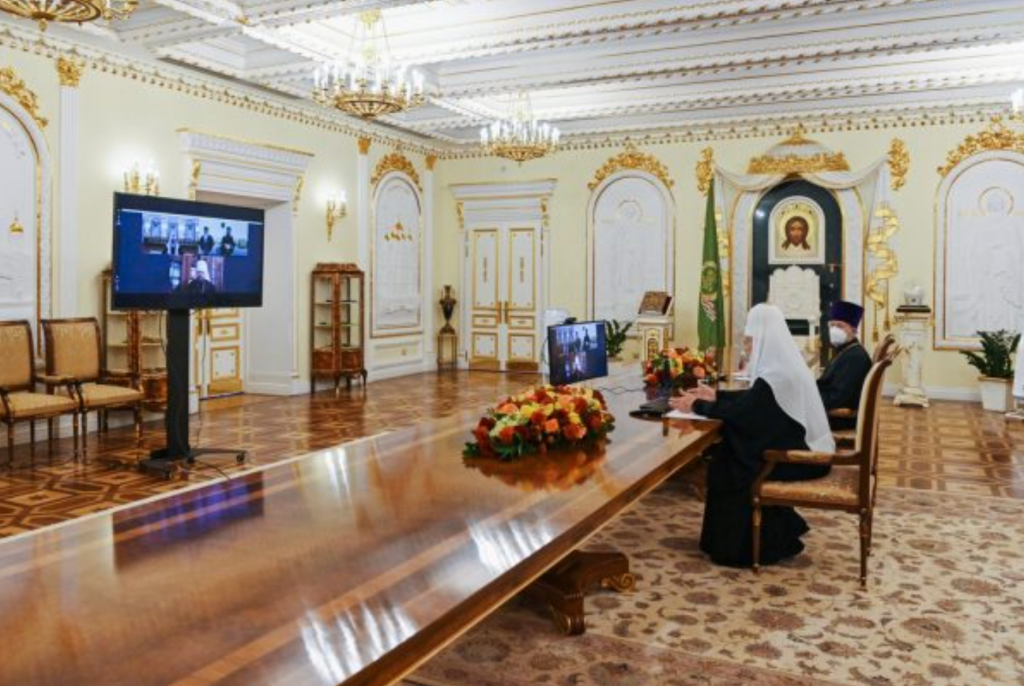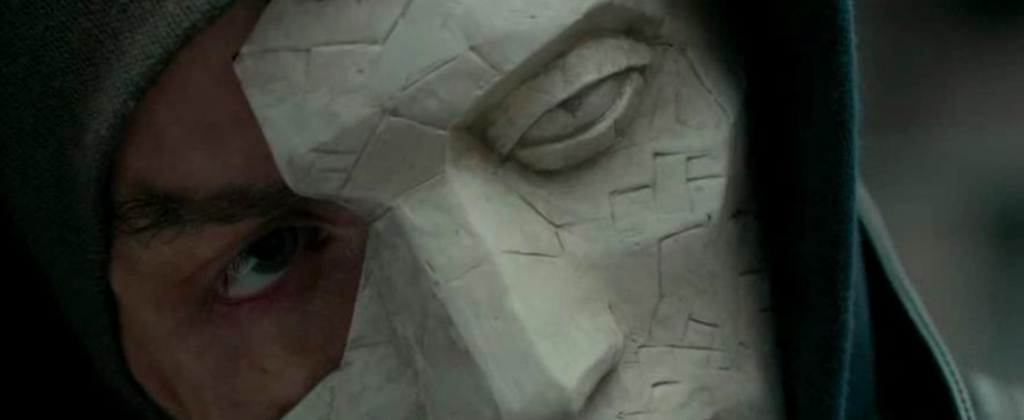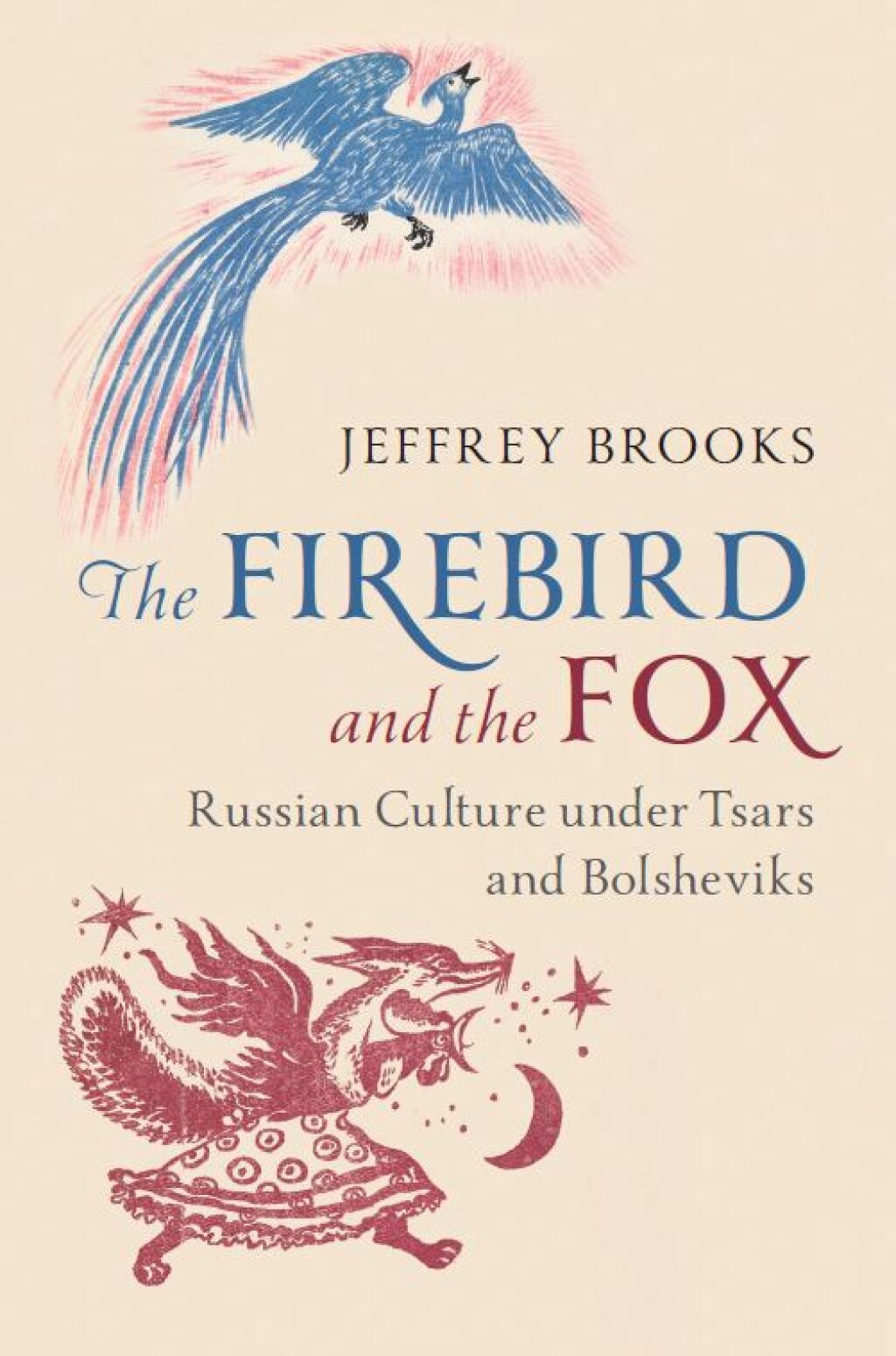We at the Jordan Center stand with all the people of Ukraine, Russia, and the rest of the world who oppose the Russian invasion of Ukraine. See our statement here.
Above: Patriarch Kirill of Moscow meets virtually with Patriarch Porfirije of Serbia on April 27, 2022. Source
Lucian N. Leustean is a Reader in Politics and International Relations at Aston University, Birmingham, United Kingdom. This op-ed was supported by the author’s participation as Senior Fellow in the Orthodoxy and Human Rights project, sponsored by Fordham University’s Orthodox Christian Studies Center, and generously funded by the Henry Luce Foundation and Leadership 100.
A version of this piece recently appeared on Religion Unplugged.
Russia’s protection of "spiritual values" in its 2021 National Security Strategy suggests five plausible scenarios for the end of its war in Ukraine. These are: a return to the nineteenth-century geopolitical empire, the development of a "Eurasian civilization," the emergence of Christian traditionalism, the "Syrianisation" of Ukraine, and the establishment of a broader European community.
Approved by the Presidential Edict 683 on December 31, 2015, the Russian Federation’s National Security Strategy included a section on "state and public security." In a surprising departure from genre, Article 43, which deals with "threats to state and public security," ranked "[destruction of] traditional Russian religious and moral values" in third place, immediately after "intelligence and other activity by special services" and "terrorist and extremist organizations." The document thus implied that protecting religious values was more important than "the activities of criminal organizations and groups," "criminal offenses," and "corruption."
On July 2, 2021, Russia updated the 2015 document with a revised National Security Strategy approved by Presidential Edict 400. The latest version presents the most detailed statement yet of Russia's position on the relationship between religion and national security. Article 28, for instance, stipulates that "Russian spiritual and moral ideals and cultural and historical values […] are the foundation for the further development of the country." A lengthy section spanning Articles 84-93 titled "The protection of traditional Russian spiritual and moral values, culture and historical memory" offers a holistic approach to religion and security, asserting that all of "humanity is faced with the threat of losing traditional spiritual and moral guidelines" and that "traditional Russian spiritual, moral, cultural and historical values are under active attack from the United States and its allies."
The significance of religion in advancing security strategies was highlighted on April 26, 2022 by Nikolai Patrushev, Secretary of the Security Council of the Russian Federation and former director of the Federal Security Service (FSB) in an interview with the governmental mouthpiece Rossiiskaya gazeta. Patrushev argued that "our spiritual and moral values allow us to remain ourselves, to be honest with our ancestors, to preserve the individual, society and the state." By contrast, "the Europeans" have "made a different choice [… by adopting liberal values]. Washington and Brussels make no secret of the fact that their sanctions are aimed at both material and spiritual impoverishment of Russians." Religion thus has a prime position in Russia’s security strategy, providing insight into its stance in diplomatic negotiations.
In order to assess when Russia’s war on Ukraine will end, we must consider five possible scenarios, all informed by the new National Security Concept.
Scenario 1: Return to nineteenth-century geopolitical empire.
In the nineteenth century, Russia supported the national aspirations of Orthodox Christian populations in southeastern Europe under the Ottoman Empire. Under the guise of defending the Orthodox faithful, Russian troops regularly advanced through the region, which the Russian state perceived as a key geopolitical link to Western Europe, the Middle East, and North Africa. It is arguably in support of this vision, that, in the February 22 speech Putin gave just before launching his invasion of Ukraine, he denied that it had ever been an independent state and re-emphasized the religious unity of the two countries. In Putin's view, "Ukraine is not just a neighboring country for us. It is an inalienable part of our own history, culture and spiritual space." Attempts to establish a land corridor in southern Ukraine, the shelling of Odesa, and efforts to join Russian troops in Transnistria recall Russia's historical quest for "spiritual space" beyond its own borders and its longstanding geopolitical ambitions. Following this thinking, the war will stop when Russia reaches the Danube Delta on the border with Romania, which would theoretically enable the further expansion of its sphere of religious and geopolitical influence in southeastern Europe.
Scenario 2: The development of a "Eurasian civilization."
An extreme version of Russia’s defense of spiritual values was put forward by Aleksander Dugin, a philosopher rumored to have close ties to the Kremlin (though some scholars dispute Dugin's proximity to the halls of power). His Foundation of Geopolitics (1997), which imagines a Russian-led Eurasian Empire extending from Dublin to Vladisvostok, remains a key reading in Russia’s military universities. In Dugin’s view, "Ukraine, as an independent state with certain territorial ambitions, represents an enormous danger for all of Eurasia." After the start of Russia’s invasion, Dugin claimed that "Russia is destined to win" because "we have no alternative." The war, he added, "is an existential threat to us, so victory is our only choice." That the idea of a "Eurasian civilization" retains influence in Putin’s inner circle is evident from former Russian President Dmitri Medvedev’s reaction to Russia’s invasion of Ukraine, which he framed as a step towards achieving an "open Eurasia, from Lisbon to Vladivostok." Nuclear threats and the use of apocalyptic messages in defending "Eurasian civilization" adds to the intensity of the conflict and the unpredictability of political decision-making on all sides. Because of the existential threat presented by Russia's nuclear arsenal, there is a chance that the war might be allowed to extend for years to come, transforming into what some Kremlin ideologues—and possibly Putin himself—are eager to understand as a permanent, quasi-religious war between East and West.
Scenario 3: The emergence of Christian traditionalism.
Over the last two decades, Eastern Orthodox Christianity has been divided between liberal and conservative communities. The establishment of a national Ukrainian Church outside Moscow’s jurisdiction has exacerbated the division lines between the Russian Orthodox Church and its adherents outside Russia, on the one hand, and the Ecumenical Patriarchate of Constantinople, on the other. Religious diplomacy has supported Russian exceptionalism in the Eastern Orthodox world as high-ranking Russian clergy regularly visit the West, Latin America, and Asia to promote the infamous Russkiy mir (Russian world) concept. In December 2021, Moscow even set up a "Patriarchal Exarchate in Africa" in the service of proselytizing this politico-religious doctrine. In his sermon of March 6, 2022, Patriarch Kirill helped justify Russia’s war on Ukraine by linking it to a larger mission to maintain endangered "traditional" values. "If humanity comes to believe that sin is not a violation of God’s law, if humanity imagines sin as just another type of human behavior," he warned, "then that is where human civilization will end." The war in Ukraine could thus end with the emergence of a new denomination of global Christianity—Christian traditionalism—with churches following Moscow’s narrative becoming gradually detached from the larger fellowship of Eastern Orthodox organizations.
Scenario 4: The "Syrianisation" of Ukraine.
The Moscow Patriarchate has also supported Russia’s military participation in the Syrian conflict. The intertwining of Russia's religious- and security-based goals for Ukraine are taking a page from strategies the Kremlin already deployed in Syria, which included the consecration of the Saint George Chapel at the Khmeimim Syrian airbase in 2016; financial support toward rebuilding destroyed churches; the involvement of clergy in exchanges of prisoners of war; and the "soft power" element of high-level meetings with Catholic prelates involved in raising awareness of Christian persecution in the Middle East. Thus far, two moments in the present conflict stand out as similar to these earlier events: first, the virtual meeting between Patriarch Kirill of Russia and Patriarch Porfirije of Serbia on April 27, 2022, in which both clergymen lamented the fate of refugees in Ukraine (with the latter expressing support for the Ukrainian Orthodox Church); and second, the Moscow Patriarchate and Russian Church’s humanitarian work in the Donbas region. These parallels again suggest that the war in Ukraine may become protracted, ending only after a resolution is reached in Syria.
Scenario 5: The establishment of a broader European community.
The European Union remains a largely political and economic project with no pan-European policy on religion, which is usually left to individual nations to work out. However, despite the absence of religion as an issue within the European integration process, religious and political leaders have regularly shared their visions of Europe's future. What might the EU's founding fathers—Robert Schuman, Jean Monnet, Konrad Adenauer, and Alcide De Gaspari—advise with respect to Russia’s invasion of Ukraine? The French President Emmanuel Macron offered a possible answer to this question by proposing the establishment of a new European political community centered around core values like energy and security. What is missing from Macron’s proposal, but was present in the founding fathers’ vision, was the idea of Europe as a "community of nations" rather than a "union of nation-states."
Due to its enormous size and near-monopoly on crucial natural resources, Russia remains an integral part of Europe. Ending the current war will require not only political and military compromise, but also serious consideration of religion as an important element of Russian-European relations going forward. For example, a new treaty replacing the 2009 Lisbon Treaty could emphasize the concept of "community," which is already mentioned in earlier versions of the document (e.g. "the European economic community" or "the European steel and coal community.") The EU's definition of "community" could expand to encompass not only mutual political and economic benefit, but also new forms of religious affiliation capable of bringing East and West together. Under this larger umbrella, Ukraine, Moldova, Georgia, and Russia might all find ways to identify with broader, "European" goals.
Other strategies that could either be incorporated into the five listed above or develop in their own right might include: setting up a religious tribunal administered by international religious organizations to condemn the politicization of religion; mediation by religious leaders at sacred Orthodox Christian sites; drawing together military expertise with the humanitarian work of religious communities; commitments to maintain not only military, but religious status quo; and providing humanitarian support to populations in need that might shift the military and political balance of power.
Conclusion: How will the war end?
No matter which scenario has a higher chance of coming to pass, a diplomatic process that does not take into account the social and political roles of religion is bound to fail, while also further eroding relations among Russia, Ukraine, and the EU.
Russia’s war on Ukraine must end not only through the cessation of violence, but also with a reassessment of the part religion has to play in global geopolitics. To end this war and prevent future ones, it is vital to rethink European relations with an eye to the complex interface of religion and security.



